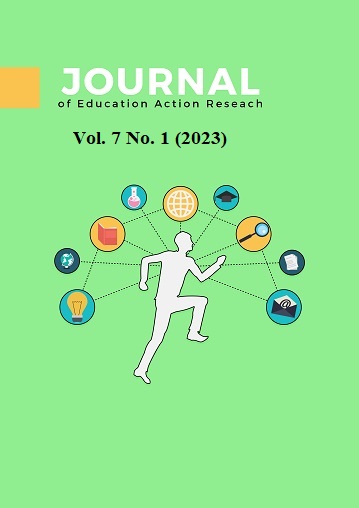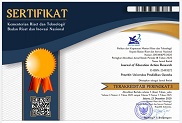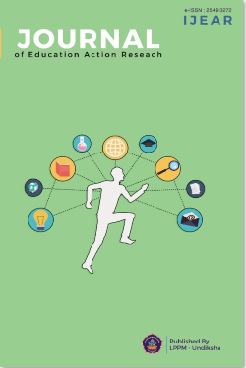The Implementation of the Inquiry Method in Improving Student Learning Outcomes in the Social Science Subject in Elementary Schools: Classroom Action Research
DOI:
https://doi.org/10.23887/jear.v7i1.53396Keywords:
Inquiry Method, Learning Outcomes, Social Science Subject, Classroom Action ResearchAbstract
This tudy aims to improve student learning outcomes in the social science subject using the inquiry method in elementary schools. Because student learning outcomes for social studies subjects are still relatively low and can be said to have not reached the minimum score or have not succeeded. Therefore, teachers are required to make changes. In this study, the researchers employed Classroom Action Research (CAR) which consisted of 3 cycles. Furthermore, each cycle had four stages: planning, implementation, observation, and reflection. The subjects of this study were fourth-grade students, totaling 27 people consisting of 14 male students and 13 female students. The tools used to collect data were learning outcome tests, documentation devices, observation sheets, and field notes. The results of this study showed as follows. At the 1st meeting of cycle I, only 5 students (18%) got a score above the Minimum Completeness Criteria. At the 2nd meeting, there was an increase to 7 students (25%). Because it did not meet the criteria for completeness, the researchers then decided to continue to cycle II. At the 1st meeting of this cycle, 9 students (33%) got a score above the Minimum Completeness Criteria. Furthermore, at the 2nd meeting, there was an increase to 10 students (37%). These results were still considered insufficient. Therefore, the researchers continued to cycle III. At the 1st meeting of this cycle, 18 students (66%) got a score above the Minimum Completeness Criteria. Moreover, at the 2nd meeting, it increased to 23 students (85%). In cycle III, the obtained learning outcomes were very good and have reached indicators of success that have been set so that learning completeness has been achieved As a result of this research, learning with the inquiry learning method is a method that can improve Student Learning Outcomes. The application of the inquiry learning method makes the learning process more enjoyable because students can better understand the material clearly. In addition, it can also help students to be more confident and active in developing their potential to show their abilities.
References
Ahmadi, F., Fakhruddin, Trimurtini, & Khasanah, K. (2018). The Development Of Pop-Up Book Media To Improve 4th Grade Students’ Learning Outcomes Of Civic Education. Asia Pacific Journal of Contemporary Education and Communication Technology, 4(1), 42–50. https://doi.org/10.25275/apjcectv4i1edu5.
Anjar, A., Adi, P. N., Siregar, M., Siregar, Z. A., & Sepriani, Y. (2020). Civic Education Teachers’ Response to The Establishment of Pancasila Ideology Agency (BPIP). MIMBAR : Jurnal Sosial Dan Pembangunan, 36(1), 12–20. https://doi.org/10.29313/mimbar.v36i1.4794.
Bednarz, S. W., Acheson, G., & Bednarz, R. S. (2006). Se_700706398-1. Social Education, 70(7), 398–404.
Budiastra, A. A. K., Erlina, N., & Wicaksono, I. (2019). The Factors Affecting Teachers’ Readiness In Developing Science Concept Assessment Through Inquiry-Based Learning Process In Elementary Schools. Advances in Social Sciences Research Journal, 6(9), 355–366. https://doi.org/10.14738/assrj.610.7133.
Camellia, Kurnisar, & Nurdiansyah, E. (2021). The Development of Documentary Film Media in Civics Education Subject. 524(Icce 2020), 38–42. https://doi.org/10.2991/assehr.k.210204.005.
Chandra, K., Degeng, I. N. S., Kuswandi, D., & Setyosari, P. (2020). Effect of guided inquiry learning model and social skills to the improving of students’ analysis skills in social studies learning. Journal for the Education of Gifted Young Scientists, 8(1), 603–622. https://doi.org/10.17478/JEGYS.654975.
FATAYAN, A., HANAFI, I., SARI, E., & GHANI, A. R. A. (2019). The Implementation of School Based Management: School Committee Involvement in Islamic Schools. International E-Journal of Educational Studies, 4(7), 106–110. https://doi.org/10.31458/iejes.608131.
Fatmawati, F., Sukariasih, L., Fayanto, S., & Retnawati, H. (2019). Investigating the Effectiveness of Inquiry Learning and Direct Learning Models Toward Physics Learning. 317(IConProCS), 260–265. https://doi.org/10.2991/iconprocs-19.2019.54.
Firman, M. A., Ertikanto, C., & Abdurrahman, A. (2019). Description of meta-analysis of inquiry-based learning of science in improving students’ inquiry skills. Journal of Physics: Conference Series, 1157(2). https://doi.org/10.1088/1742-6596/1157/2/022018.
Ghani, A. R. A., Fatayan, A., Azhar, N. C., & Ayu, S. (2022). Evaluation of technology-based learning in an Islamic school. 20(3), 190–195.
Haryati, S., Sukarno, S., & Purwanto, S. (2021). Implementation of Online Education During the Global Covid-19 Pandemic: Prospects and Challenges. Cakrawala Pendidikan, 40(3), 604–612. https://doi.org/10.21831/cp.v40i3.42646.
Khasinah, S. (2013). Classroom Action Research. Jurnal Pionir, Volume 1, Nomor 1, 1(2), 33–61.
Kunlasomboon, N., Wongwanich, S., & Suwanmonkha, S. (2015). Research and Development of Classroom Action Research Process to Enhance School Learning. Procedia - Social and Behavioral Sciences, 171, 1315–1324. https://doi.org/10.1016/j.sbspro.2015.01.248.
Mao, S.-L., & Chang, C.-Y. (1998). Impacts of an Inquiry Teaching Method on Earth Science Students’ Learning Outcomes and Attitudes at the Secondary School Level. Proc. Natl. Sci. Counc. ROC(D), 8(3), 93–101.
Muthohar, A. (2021). Implementation and Development Models of Character Education in School. Jurnal Penelitian Pendidikan Dan Pembelajaran, 8(2), 69–82. https://doi.org/10.21093/twt.v8i2.3236.
Nurhayati, D. A. W., Putranto, A., Marwa, D. M., & Purwowidodo, A. (2020). Effect of Thinking Skill-Based Inquiry Learning Method on Learning Outcomes of Social Studies: A Quasi-Experimental Study on Grade VIII Students of MTSN 6 Tulungagung. IOP Conference Series: Earth and Environmental Science, 485(1). https://doi.org/10.1088/1755-1315/485/1/012073.
Permatasari, B. D., Gunarhadi, & Riyadi. (2019). The influence of problem based learning towards social science learning outcomes viewed from learning interest. International Journal of Evaluation and Research in Education, 8(1), 39–46. https://doi.org/10.11591/ijere.v8i1.15594.
Purwanita, Y., Riyanto, Y., & Suyanto, T. (2019). The Influence of Multimedia Assisted Inquiry Learning Methods on My Heroes Theme of Critical Thinking Skills and Learning Outcomes of Class IV Students ofElementary School. International Journal of Scientific and Research Publications (IJSRP), 9(7), p9169. https://doi.org/10.29322/ijsrp.9.07.2019.p9169.
Retnasari, L., Setyaningrum, D., & Prasetyo, D. (2022). Culture of the School Literacy Movement (GLS) for Students in Elementary Schools to Realize the 2045 Golden Generation. 8(1), 179–189.
Ruli, F. F., Hala, Y., & Syamsiah, S. (2019). Pengaruh Penerapan Model Pembelajaran Inkuiri Terbimbing Terhadap Motivasi dan Hasil Belajar Siswa pada Mata Pelajaran Biologi Kelas X SMA Negeri 3 Tana Toraja. Biology Teaching and Learning, 1(2), 151–159. https://doi.org/10.35580/btl.v1i2.8182.
Sari, I. S., Lestari, S. R., & Sari, M. S. (2020). Development of A Guided Inquiry-Based E-module on Respiratory System Content Based on Research Results of the Potential Single Garlic Extract (Allium sativum) to Improve Student Creative Thinking Skills and Cognitive Learning Outcome. Jurnal Pendidikan Sains Indonesia, 8(2), 228–240. https://doi.org/10.24815/jpsi.v8i2.17065.
Sumarni, W., Wardani, S., Sudarmin, S., & Gupitasari, D. N. (2016). Project based learning (PBL) to improve psychomotoric skills: A classroom action research. Jurnal Pendidikan IPA Indonesia, 5(2), 157–163. https://doi.org/10.15294/jpii.v5i2.4402.
Syahrial, S., Asrial, A., Kurniawan, D. A., Nugroho, P., Septiasari, R., Pratama, R. A., & Perdana, R. (2019). Increased Behavior of Students’ Attitudes to Cultural Values Using the Inquiry Learning Model Assisted by Ethnoconstructivism. Journal of Educational Science and Technology (EST), 5(2), 166–175. https://doi.org/10.26858/est.v5i2.9670.
Verawati, S., Prayogi, S., Gummah, A., Muliadi, M. Y., & Yusup. (2019). The Effect of Conflict-Cognitive Strategy in Inquiry Learning towards Pre-Service Teachers’ Critical Thinking Ability. Jurnal Pendidikan IPA Indonesia, 8(4), 529 – 537. https://doi.org/10.15294/jpii.v8i4.21002.
Vogelzang, J., & Admiraal, W. F. (2017). Classroom action research on formative assessment in a context-based chemistry course. Educational Action Research, 25(1), 155–166. https://doi.org/10.1080/09650792.2016.1177564.
Wanzek, J., Vaughn, S., Kent, S. C., Swanson, E. A., Roberts, G., Haynes, M., Fall, A. M., Stillman-Spisak, S. J., & Solis, M. (2014). The Effects of Team-Based Learning on Social Studies Knowledge Acquisition in High School. Journal of Research on Educational Effectiveness, 7(2), 183–204. https://doi.org/10.1080/19345747.2013.836765.
Yulianti, D., Khanafiyah, S., & Sulistyorini, S. (2016). Inquiry-based science comic physics series integrated with character education. Jurnal Pendidikan IPA Indonesia, 5(1), 38–44. https://doi.org/10.15294/jpii.v5i1.5787.
Zubaidah, I., Weni, I. M., & Sadhana, K. (2021). Implementation of the G* Gold Way Model in Student Character Education: Study of Actualization of Social Reality in Character Education of Students at Madrasah …. International Journal of Scientific and …, 1(7), 1–12.
Zuraidah, S., Syamsi, K., & Ashadi, A. (2020). Improving the story-telling skill of grade 1 students through the use of hand puppet media. Jurnal Prima Edukasia, 8(2), 166–176. https://doi.org/10.21831/jpe.v8i2.33831.
Downloads
Published
How to Cite
Issue
Section
License
Copyright (c) 2022 arum fatayan

This work is licensed under a Creative Commons Attribution-ShareAlike 4.0 International License.












